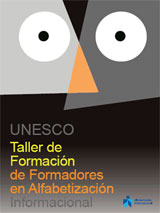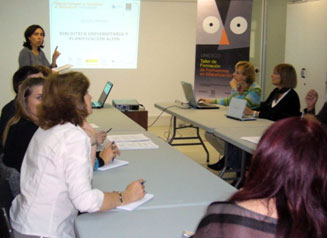The eighth UNESCO Training-the-Trainers workshop in Information Literacy concluded in Seville, Spain
03-11-2008 (Seville)

Workshops logo
© N. Erol Olcay
The eighth UNESCO Training-the-Trainers Workshop in Information Literacy was held from 27 to 29 October 2008 at the Library of Andalusia in Granada, Spain, and concluded last week at the Foundation ‘Three Cultures of the Mediterranean’ in Seville, Spain.
The workshop was one in the series of 11 regional workshops organized by UNESCO within the framework of its global project to “train the trainers” in information literacy and therefore enable people to reap the full benefits of the emerging knowledge societies.
Information literacy is a means to empower people in all walks of life to seek, evaluate, use and create information effectively to achieve their personal, social, occupational and educational goals.
The workshop focused on developing a model to introduce information literacy within educational institutions such as schools and universities. The participants concluded that the ideal model is to acquire a combination of skills, competencies, knowledge, attitudes and behaviours. The introduction of such a model should be based on a close collaboration between teachers, librarians and students in order to change their personal and interpersonal interaction patterns. For example:
UNESCO, with its mandate to help all people access information and knowledge they need to improve their daily lives, has taken a lead role to foster information literacy worldwide.
Information literacy is a means to empower people in all walks of life to seek, evaluate, use and create information effectively to achieve their personal, social, occupational and educational goals.
The workshop focused on developing a model to introduce information literacy within educational institutions such as schools and universities. The participants concluded that the ideal model is to acquire a combination of skills, competencies, knowledge, attitudes and behaviours. The introduction of such a model should be based on a close collaboration between teachers, librarians and students in order to change their personal and interpersonal interaction patterns. For example:
- Teachers must shift from classic professorial modes to become facilitators, that is to say to become knowledge providers to knowledge managers, instructors to team leaders, to offer guidelines instead of just lectures, to develop close relationships with their students, and to promote greater diversity of ideas and participation of students in the learning process;
- Librarians must shift from technical work to intermediation, from isolation to collaboration, from conservation to innovation and from reactive user-trainer modes to proactive teacher-trainer modes;
- Students must shift from individual learning to group learning, from reactive audience to proactive participants, from dependency to independency, and from temporary and intermittent learning to life-long learning.
UNESCO, with its mandate to help all people access information and knowledge they need to improve their daily lives, has taken a lead role to foster information literacy worldwide.
 Participants of the workshop
Participants of the workshop© UNESCO
Related themes/countries
· Spain
· Information for All Programme (IFAP)
· Information Literacy
Share this story:
Contact information
- UNESCO
Source














